#xifu
Explore tagged Tumblr posts
Note
If the coats with hoods aren’t historically accurate, what coats did Chinese people wear prior to the modern period?
Hi! Thanks for the question, and sorry for taking ages to reply!
By "coats with hoods", I assume you're referring to the doupeng/斗篷 (cloak/cape) commonly seen in modern hanfu and guzhuang (drama costumes), like the one below (x):
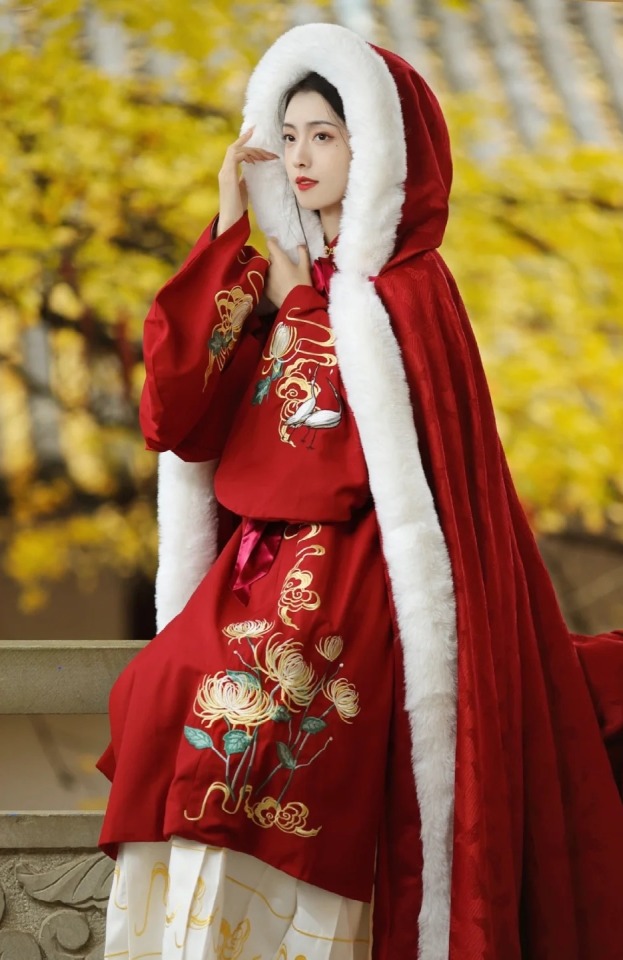
Chinese people did wear doupeng prior to the modern period, along with other kinds of coats. However, as I mentioned in my post here, historical Chinese doupeng did not have hoods attached to the cloak/cape. That is why many modern doupeng aren't considered historically accurate - because they have hoods attached. Below are examples of more historically accurate, hoodless doupeng (1/2):
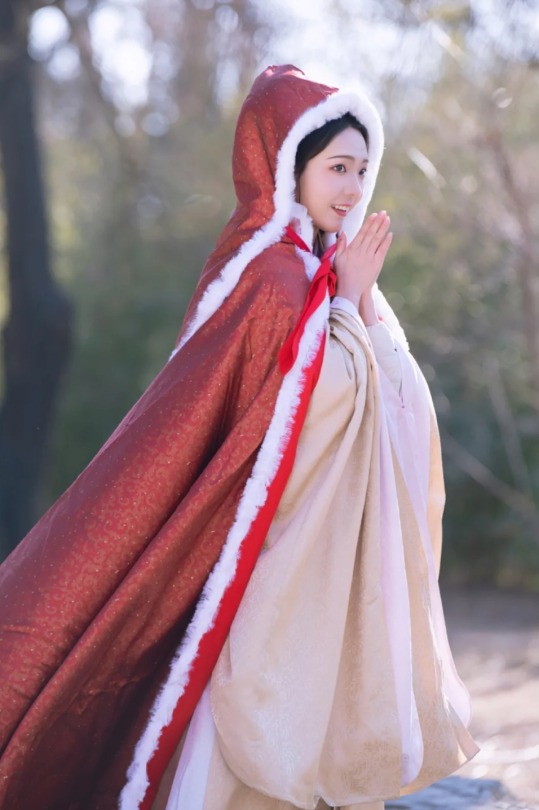
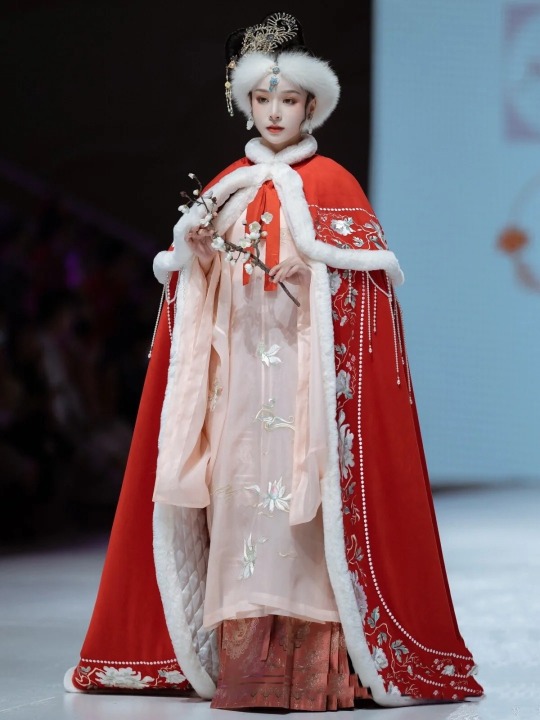
In the image on the above left, the model is wearing a separate, detached hood/hat called fengmao/风帽 (wind hat) which was historically worn to keep warm. Below - examples of fengmao (1/2):
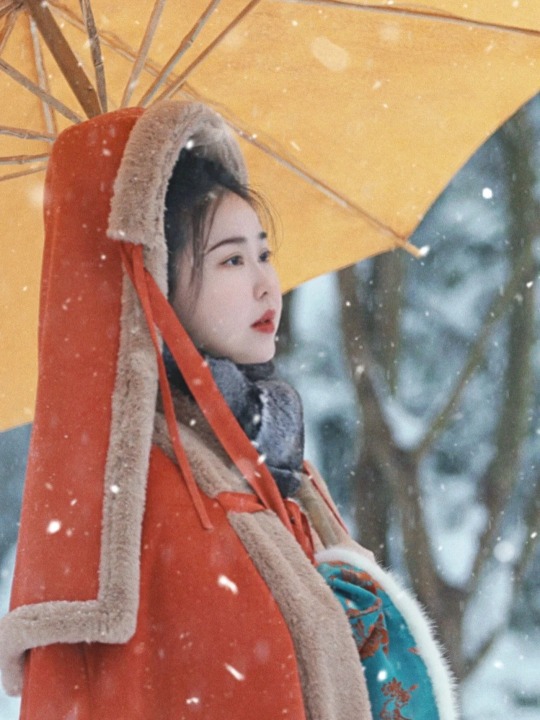
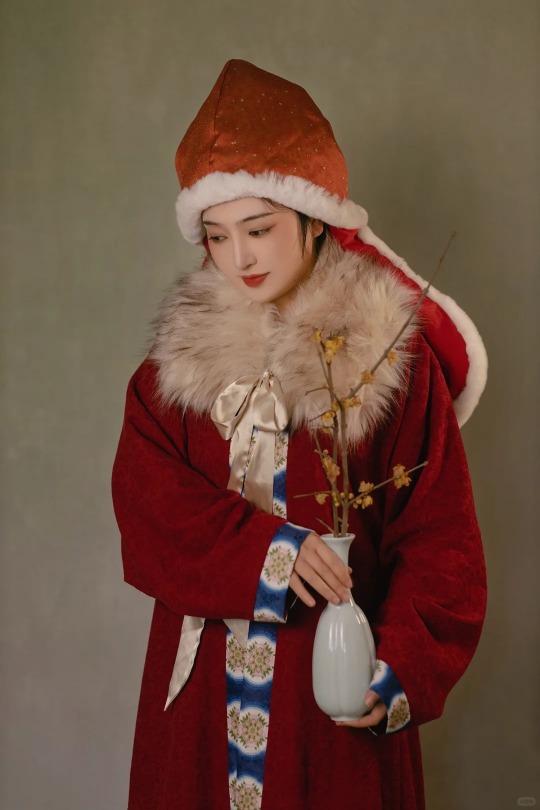
Historically, fengmao was often worn with doupeng when travelling during cold weather (x). Below - women wearing doupeng & fengmao in historical art (top row), and Chinese opera performers wearing doupeng & fengmao as part of their costumes (bottom row) (x):
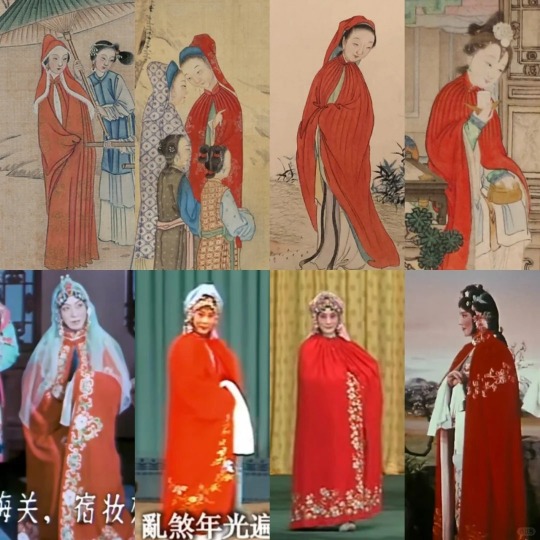
Oftentimes the doupeng & fengmao are matching, which can give the impression that they are attached - but if you look carefully, you can see that they are separate. Below - Chinese opera costume (x):
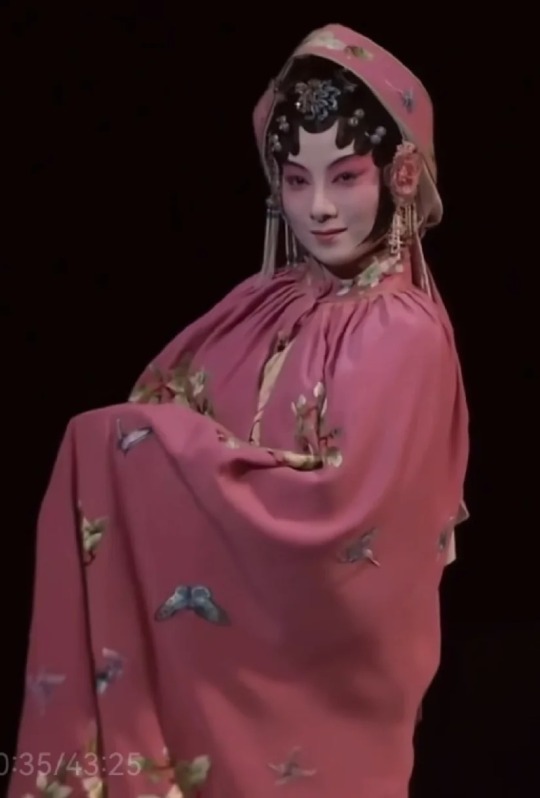
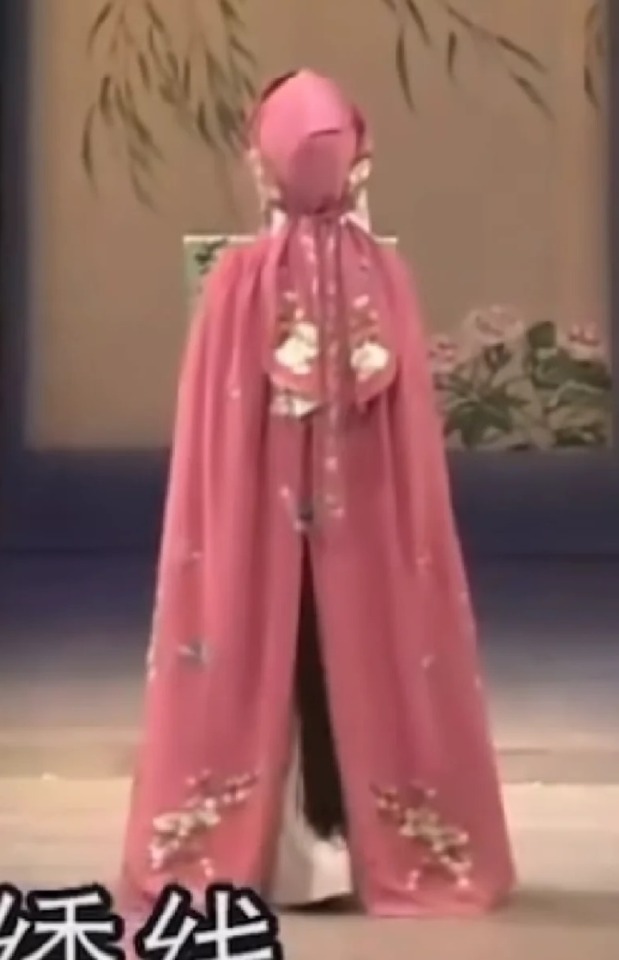
Below are historical photos of women wearing doupeng in 1920s Beijing - note how they are hoodless (1/2):
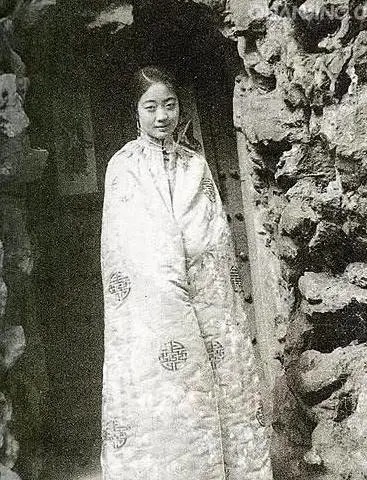
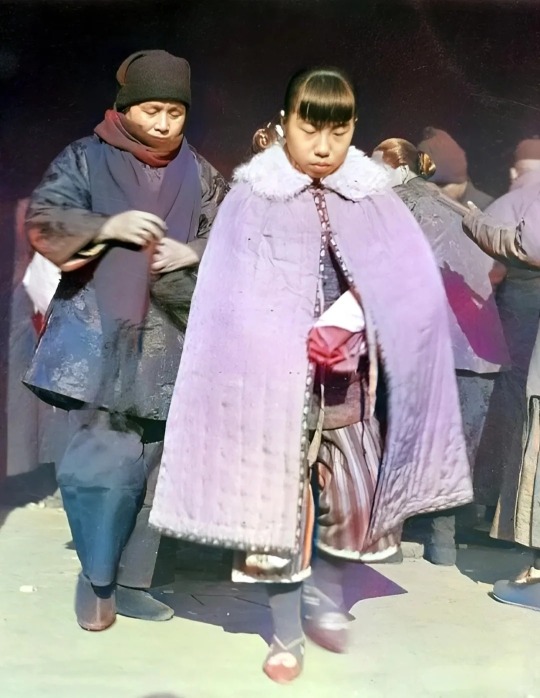
Hooded doupeng, in contrast, are more similar to historical western cloaks, such as the below American/European cloaks from the 18th century (1/2):


The hooded doupeng of modern hanfu are likely based on those seen in guzhuang dramas - another instance of drama costumes not being the most historically accurate (x):
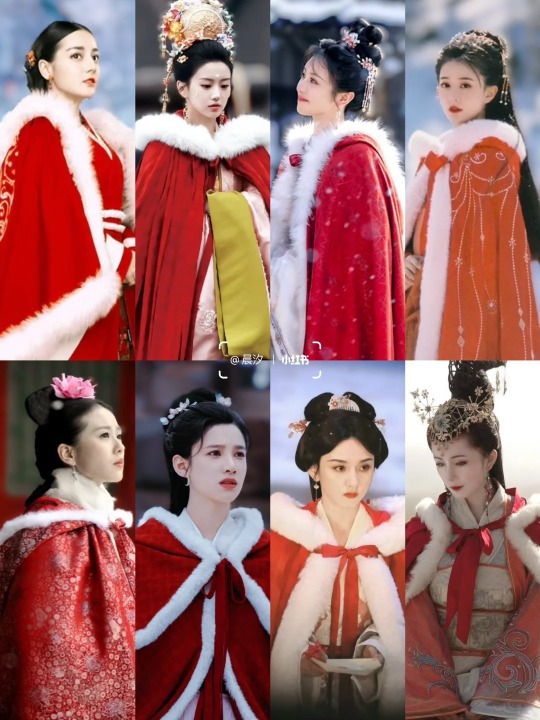
An example of a drama with a historically accurate depiction of doupeng & fengmao is the 1987 TV adaptation of Dream of the Red Chamber. As seen in the below images, the characters wear hoodless doupeng & occasionally matching fengmao as part of their winter wardrobe (1/2/3):
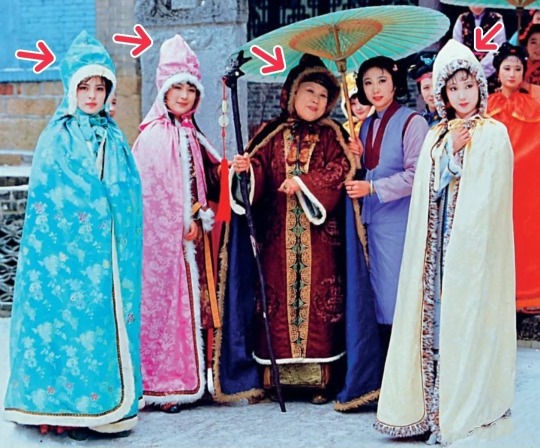
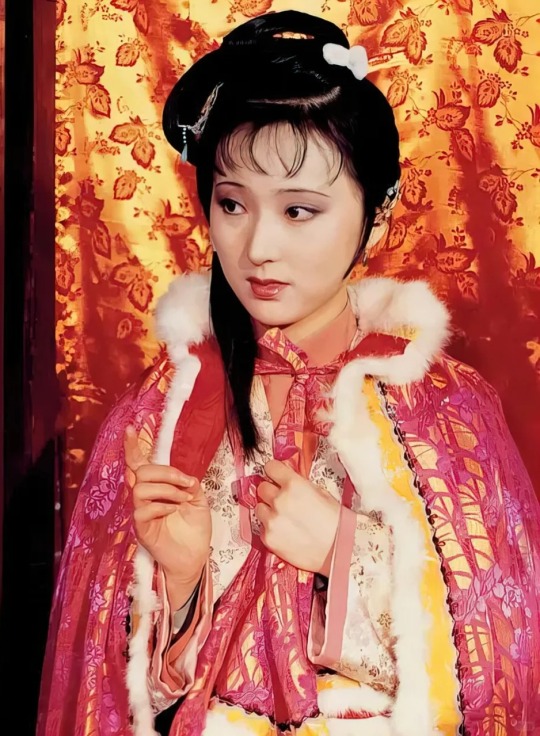
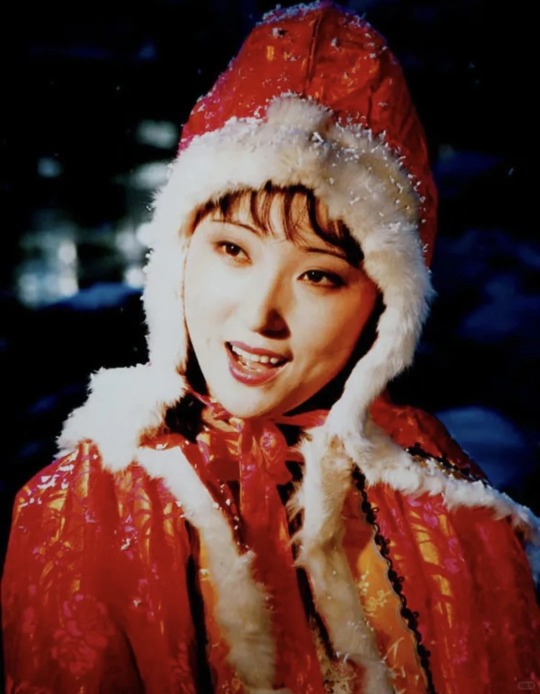
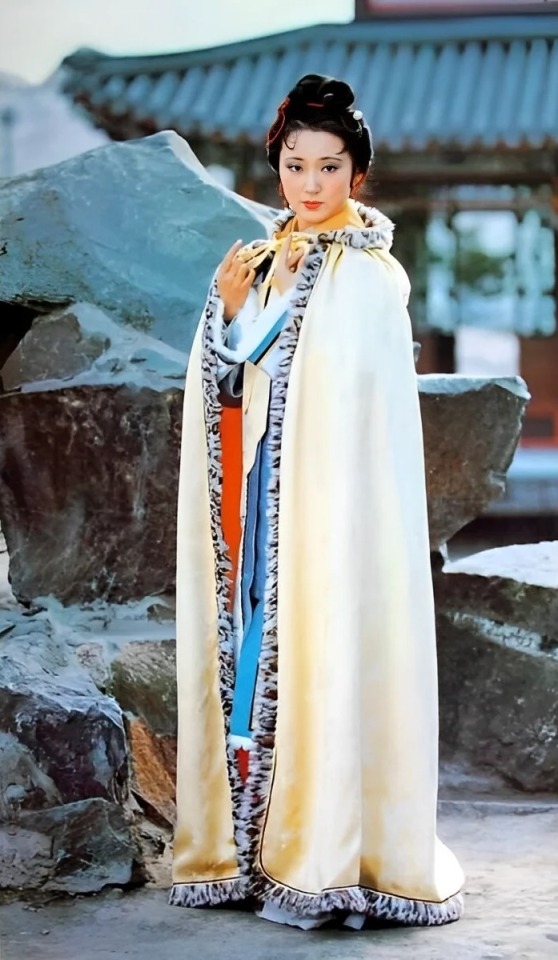
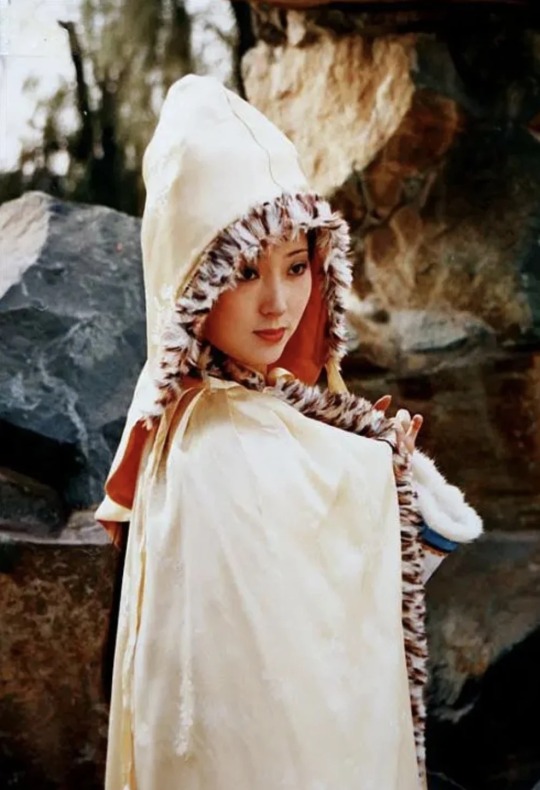
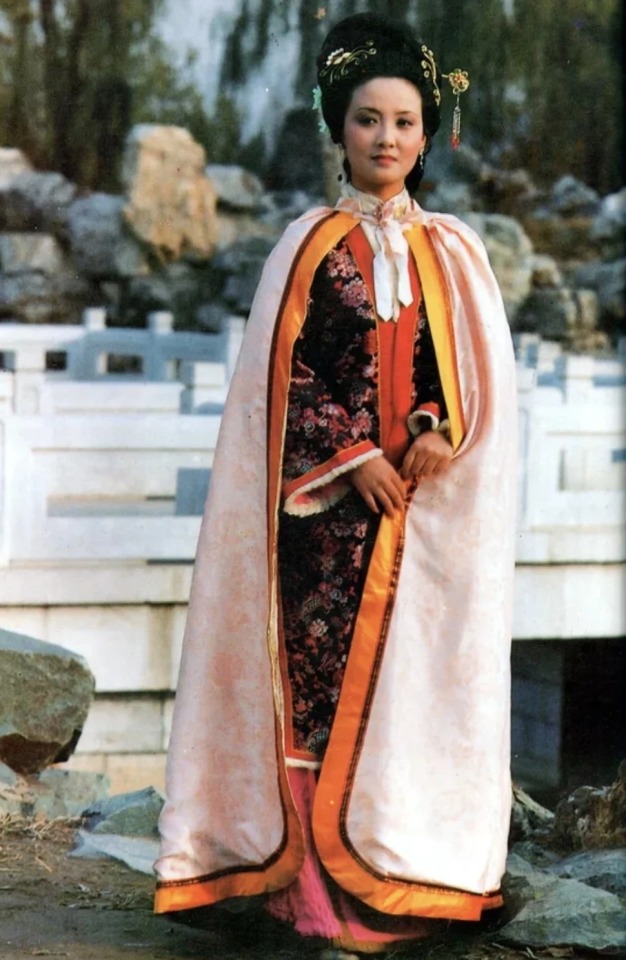
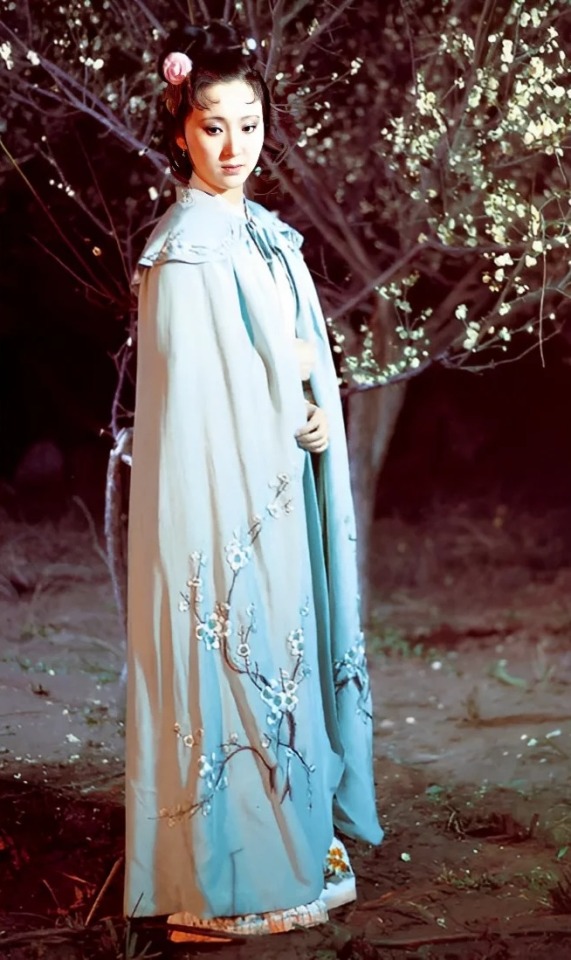
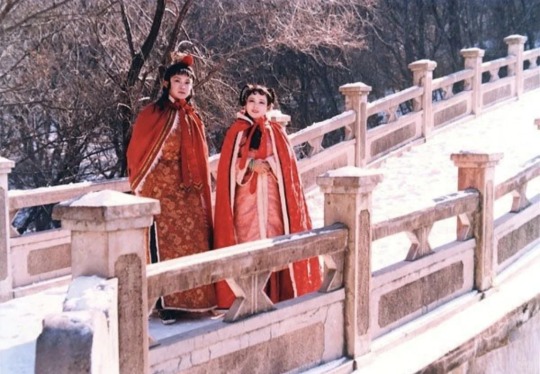
The 1994 TV adaptation of Romance of the Three Kingdoms also depicts historically accurate, hoodless doupeng & matching fengmao worn by men (x):
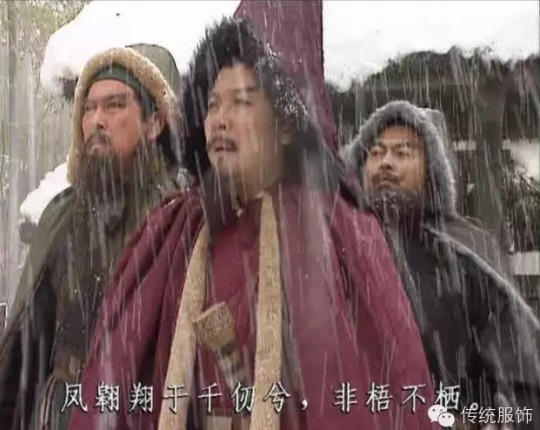
For more references, please check out my doupeng, fengmao, and winter wear tags.
Hope this helps!
#hanfu#doupeng#cloak#cape#fengmao#hats#winter wear#hanfu accessories#chinese opera#opera costume#xifu#drama costumes#dream of the red chamber#>500#china#history#reference#ask#reply#chinese clothing#chinese fashion#chinese culture
995 notes
·
View notes
Text
萝卜's Beginner Guide to Sichuanese!
大家好!
Welcome to the first in an unofficial series of posts where I will share the (very large) amount of new vocab, cultural experiences, and topics that I was introduced to while spending ~5 weeks in China!
Today’s topic is: Sichuanese! 🌶️🌶️🌶️
I won’t pretend to be an expert in Sichuanese (yet, please chime in / add here if you are!), but I spent >50% of my time in the province while abroad which gave me lots of exposure. It certainly took me by surprise at the beginning! After about two weeks I started to get a better feel for it. Here’s some tips and vocab for getting started:
1. Get ready to hear 得 (“dei” pronunciation) just about everywhere, this is an essential character thrown around constantly. Most common are these three words:
要得 (yǎodei) – yes, good
没得 (módei) – no
晓得 (xiǎodei) – understand, aka 明白
Sometimes it also just randomly appears, for example 得行 (deixíng) has the exact same meaning as 行 (fine, okay)! You just gotta expect it.
2. The majority of Sichuanese people do not pronounce the “h” in sounds like “ch”, “sh”, “zh”. This makes it very tricky for a student (like me!) who still internally looks up lots of words, so any “s-” word could be a word that starts with “sh-” OR a word that just starts with “s-”. Some examples:
橙汁 (chéngzhī) as "cengzi"
这儿 (zhè’er) as “zer”
什么时候 (shénme shíhou) as “sazisihou”
是不是 (shìbùshì) as “sib’si” (with the u sound in “bu” typically omitted)
3. The “an” sound is pronounced as in the English word “can” (as opposed to the usual pronunciation which is a bit more like the “awn” sound in “yawn”). Combined with (2), this has the very cute effect of turning 吃饭 (chīfàn) into something more like “cifaan”, and is something you should expect to hear a lot in a province like Sichuan! Just be aware that this applies to every “an”-suffixed word and can sometimes totally change how you hear it. In many ways I feel like this feature makes it sound a bit reminiscent of American southern dialects.
4. There are a few other Sichuanese alternative pronunciations to be aware of:
“Hu” is often pronounced as “fu”, leading 护照 (hùzhào) to sound like “fuzao”, or 西湖 (Xīhú) as “xifu”
“R” sounds can sometimes be pronounced with a “y”, e.g. 容 (róng) as “yong”
Most tricky is that the flat 1st tone is very rare, and many characters simply have different tones than “Standard” Mandarin. As far as I can tell (and have read online), there isn’t really a systematic adjustment for this, it’s just how it is ¯\_(ツ)_/¯
5. Surprisingly, though Sichuan is a southern province, there are tons of erhua around! At least here, it seems like the 儿 ends up quite merged with the original word. Some examples I heard:
米粉 (mǐfěn) as “mifer” (extremely delicious breakfast option!)
老板 (lǎobǎn) as “laober”
没得 (módei) as “moder” (apparently extremely rarely heard though)
豆花 (dòuhuā) as “douhua’er” (quite common in northern Mandarin as well)
熊猫 (xióngmāo) as “xiongmer”
And finally, a few more Sichuanese specialties!
好(多)钱 - how much does it cost, aka 多少钱 (the 多 is sometimes omitted in quick speech)
啥子 (sázi) – what, based on the casual substitute word 啥 for 什么 (also often pronounced as s��za)
闹热 (nàorè) – lively, as opposed to the usual 热闹
可以 (kěyǐ), pronounced as as “kǒyǐ”
冒菜 (màocài) – a local variant of malatang (麻辣烫)
抄手 (chāoshǒu) – (v) to fold arms up the sleeves; (四川) wonton, dumpling
稀饭 (xīfàn) – congee, 粥, literally "thin rice"
干饭 (gānfàn) – regular rice, 米饭, "dry rice" to distinguish from 稀饭
嘛 (ma) - often heard at the end of sentences, just a local sound! Not (as I understand it) generally associated with some of its other meanings (like impatience, stating the obvious, etc)
See you next time. 下次见!
#vocab#sichuan#sichuanese#sichuan dialect#mandarin#mandarin vocab#chinese language#mandarin chinese#chinese#language learning#chinese vocab#mandarin langblr#chinese langblr#langblr#chinese dialect
52 notes
·
View notes
Text







WayV Xiaohongshu Update (240529)
How do you get your dog to cooperate with taking selfies and look at the camera? It is said that you have to find the walking pet encyclopedia Xiao Xifu'
15 notes
·
View notes
Text



2024 Barbie Lunar New Year Doll
Barbie is enchanting in a traditional xifu costume, inspired by the beauty of Peking Opera, a cultural treasure of China and often performed to celebrate Lunar New Year and other Chinese holidays. Her elegant robe in lucky red with a colorful peony print symbolizes good fortune. Her dramatic water sleeves are used to create beautiful hand motions and expressions on stage. The look is completed with an ornate headdress with peony accents and cyan blue shoes with pink poms.
Source: https://creations.mattel.com/products/2024-barbie-lunar-new-year-doll-hrm57
1 note
·
View note
Note
Hi my friend wanted to ask about Chinese Opera and the red pom poms on their hats and their significance. I asked my mom and she said they were for decoration so I just wanted clarification
Hi! Thanks for the question, and sorry for taking ages to reply!
The pom poms you see on 盔头/kuitou (Chinese opera headdresses) are called 绒球/rongqiu (lit. "velvet ball"). They are often red, but can also be other colors, and vary in size. Rongqiu are decorative and serve to distinguish the many different types of kuitou from one another. Each type of kuitou is distinct in the number, size, and color of rongqiu that it's decorated with (of course, not all kuitou have rongqiu).
Below - a few different types of Beijing opera kuitou decorated with rongqiu (x):
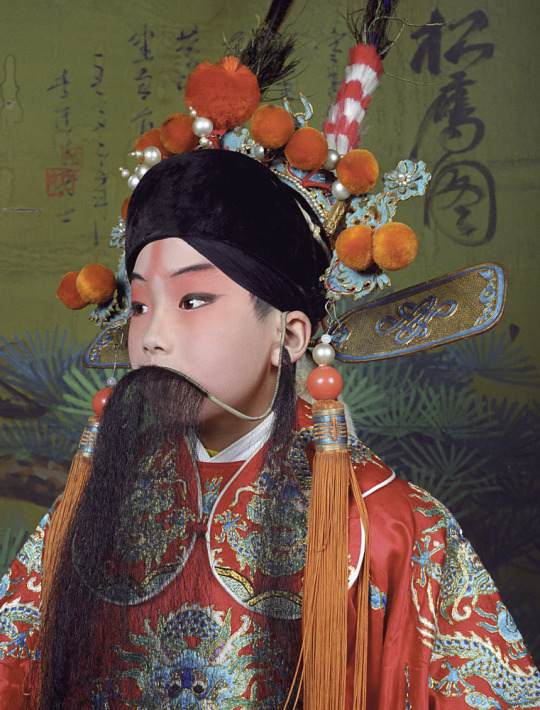
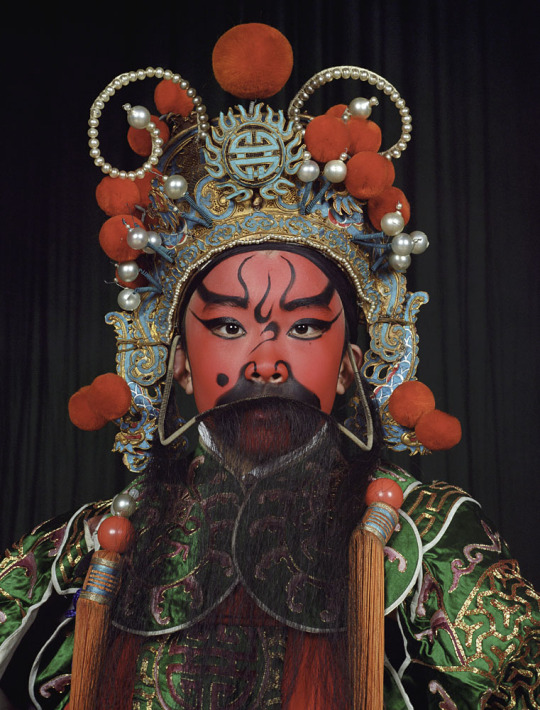
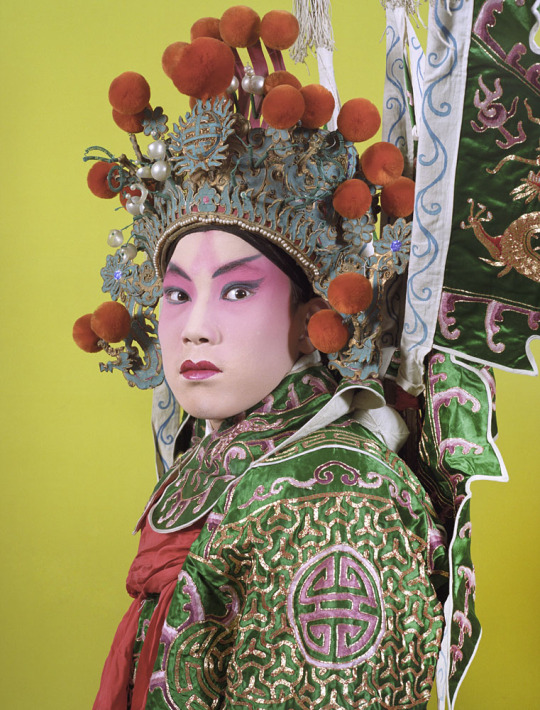
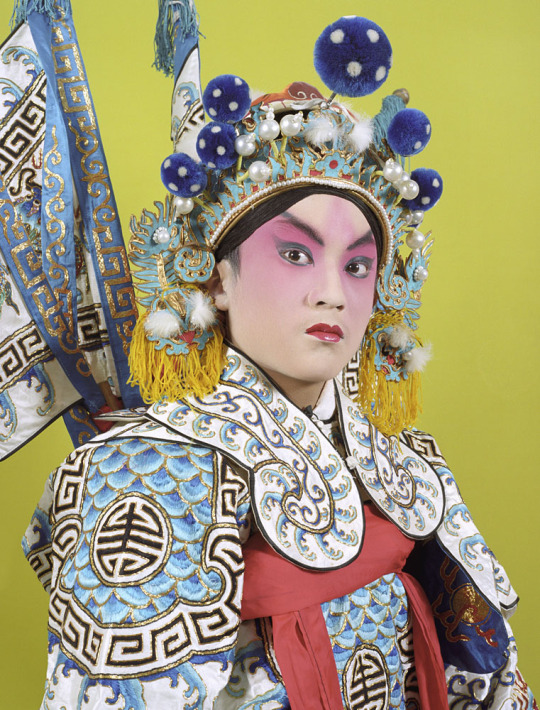
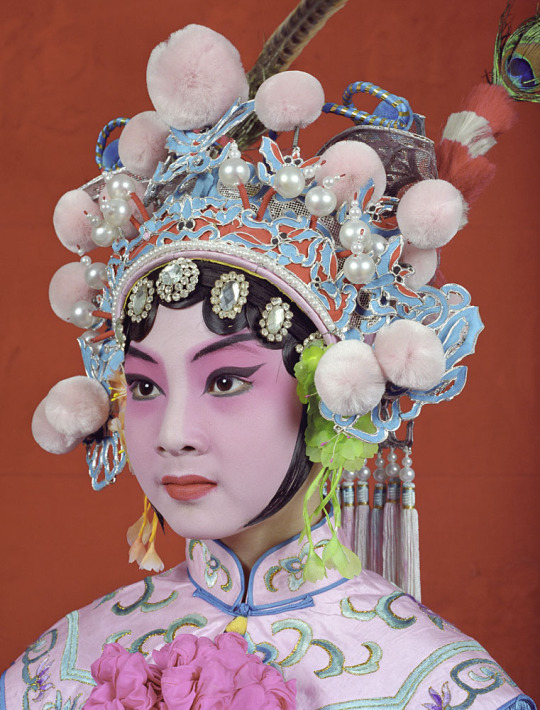
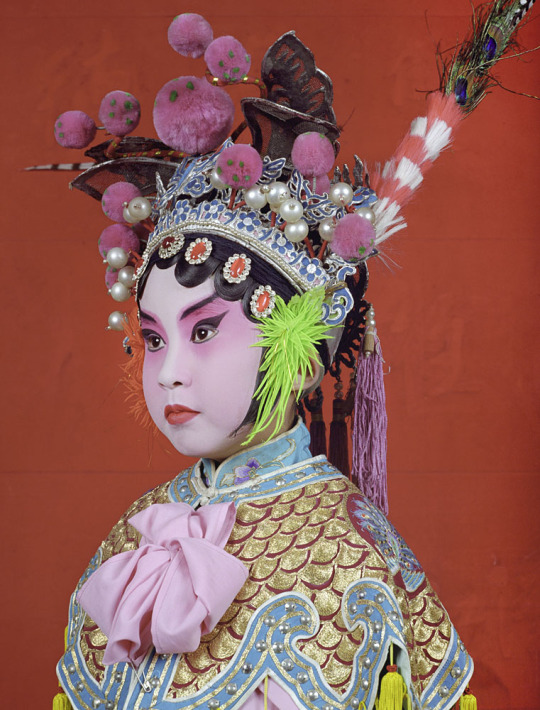
Rongqiu isn't used just for Chinese opera performances - it's a very common decorative item for Chinese headwear, especially for traditional/folk performances.
Below - examples of rongqiu use in folk custom/performance costumes, left to right: 1) 游神/youshen (wandering gods) procession in Fujian (x), 2) 英歌舞/yingge wu (yingge dance) performer in Guangdong (x), 3) & 4) 高跷/gaoqiao (stilt walking) performers in a 社火/shehuo parade in Gansu (x):

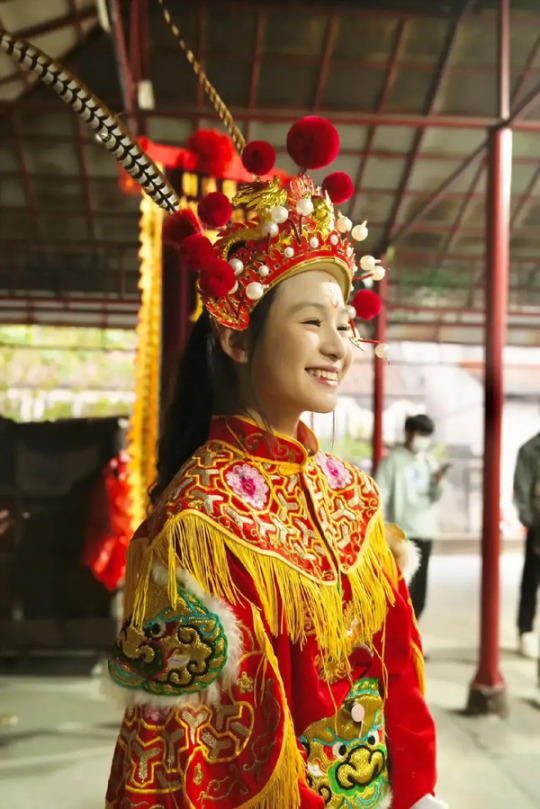

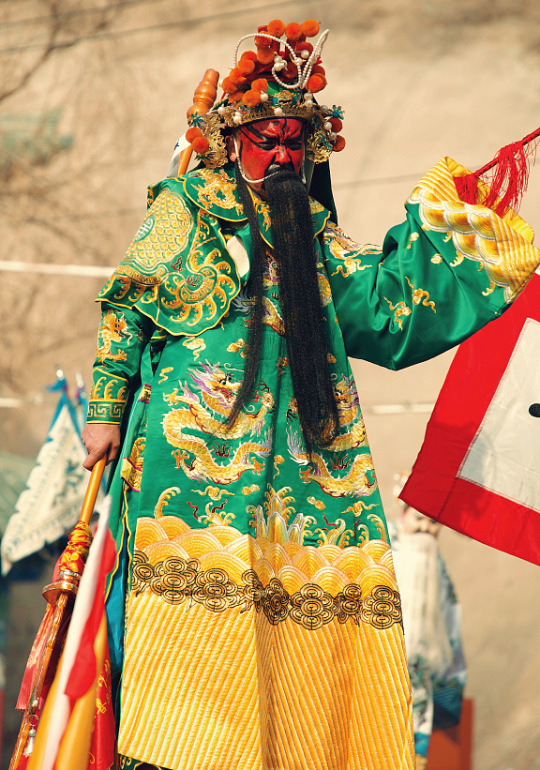
As a festive decoration, rongqiu was also widely used on bridal guan (crowns) from the Qing dynasty into the modern day.
Below - examples of rongqiu use in historical bridal guan: Left - a bride during the late Qing dynasty, circa 1890 (x); Right - a bride during the Republican era/minguo, in 1939 (x):
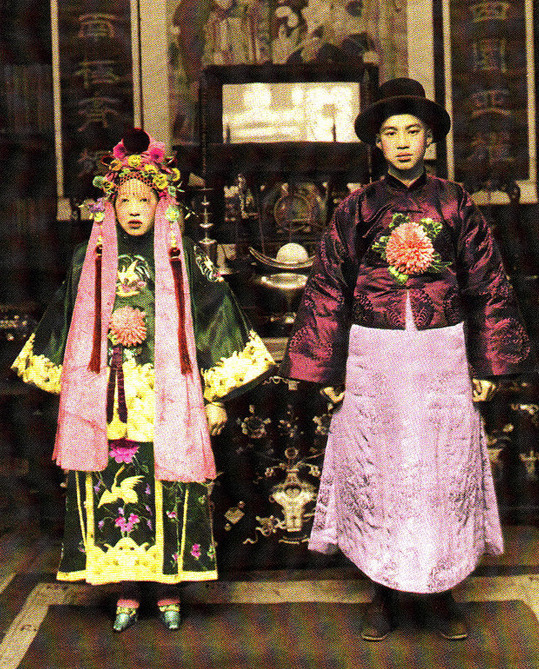
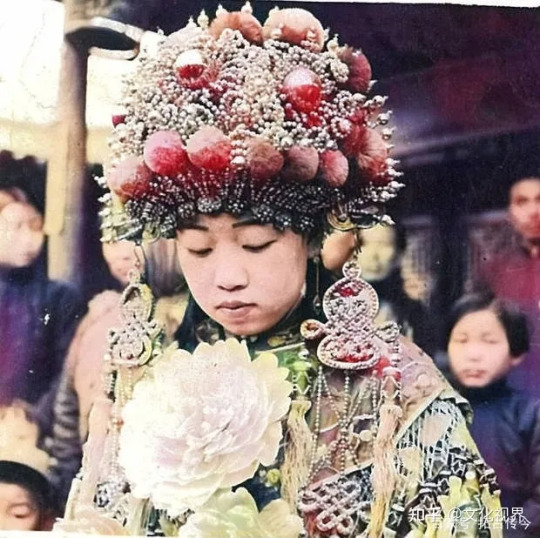
For some reason it's been extremely difficult to find sources on the origin of rongqiu that would shed more light on its significance, but based on historical paintings the use of rongqiu as a head ornament may have originated in the Qing dynasty. During the late Qing dynasty, it was fashionable among women to wear rongqiu on the sides of their hair, as can be seen in the paintings below (x):

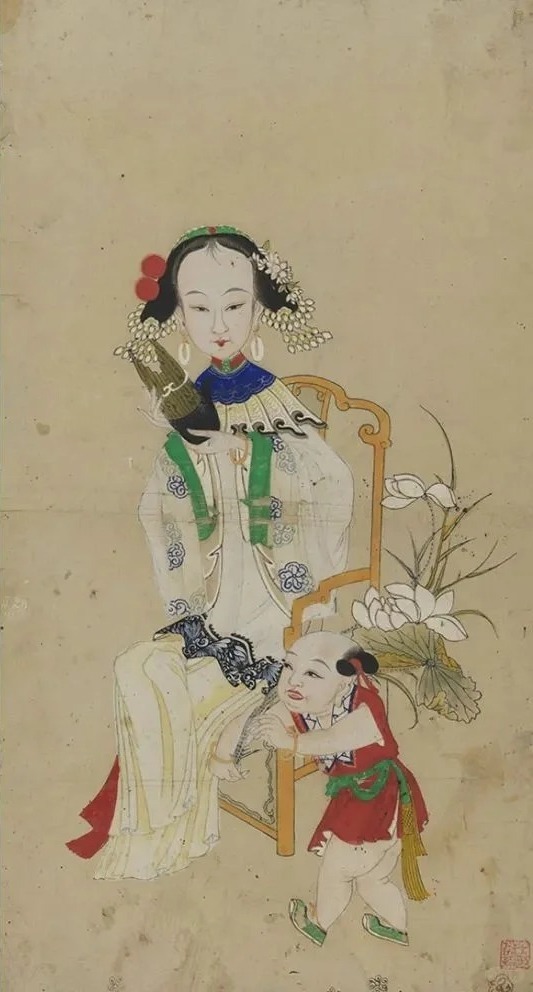
This particular style of rongqiu hair ornament was depicted in the 2012 historical cdrama 娘心计/Mother's Scheme:
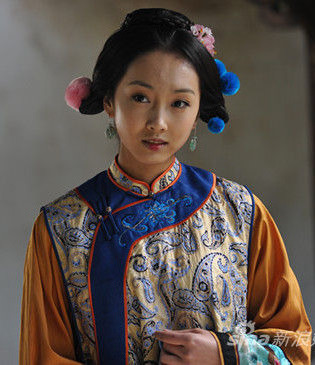
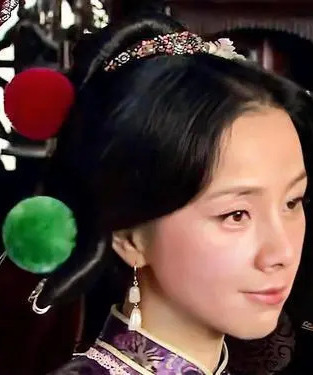
For more references, please see my rongqiu and kuitou tags.
If anyone has more information on the significance of rongqiu, please do share!
Hope this helps ^^
#rongqiu#pompoms#kuitou#chinese opera#opera costume#xifu#hanfu#history#reference#ask#reply#junpeicindystories#chinese fashion#chinese clothing#china
595 notes
·
View notes
Text
wikipedia fact
Doulu's and Wei's downfall, however, would come shortly after that. Doulu, after completing Li Cunxu's tomb, returned to his mansion and waited for the next assignment, as was traditional at the time for a director of an imperial tomb, and he expected to be removed from his chancellor position but made a circuit military governor. After several days, however, the next imperial commission did not come, and at the urging of his family members and friends, he went to the imperial court, implicitly pressing the issue. This offended An, who publicly humiliated Doulu by stating, "Your title of director of the imperial tomb is still present, but you do not wait for the new assignment before coming to the imperial court. Is it that you believe that we, as people from a border region, can easily be deceived?" (Both Li Siyuan and An were non-Han Chinese.) Doulu and Wei were also being perceived poorly publicly for several different reasons — they were considered to be disrespectful to the emperor while reporting to him; while other imperial officials at that time were taking a reduced amount of their salaries, Doulu and his sons were receiving full pay; and while the other imperial officials backpay were being calculated from the day of Li Siyuan's ascension, Doulu and Wei were still calculating their own from during the time of Li Cunxu's reign. Meanwhile, Xiao Xifu had long resented Doulu and Wei for having rejected his earlier proposed promotion to Jianyi Daifu (諫議大夫), and therefore decided to take vengeance. He submitted a petition in which he not only accused Doulu and Wei of flattery and faithlessness to Li Cunxu, but further falsely accused Doulu of seizing people's farms and allowing his farmer tenants to kill others, and Wei of seizing a neighbor's well in order to steal the treasures that the neighbor's ancestors had hidden in the well. Upon receiving Xiao's petition, Li Siyuan exiled Doulu and Wei — in Doulu's case, to be the prefect of Chen Prefecture (辰州, in modern Huaihua, Hunan), then as census officer of Fei Prefecture (費州, in modern Tongren, Guizhou), and then completely stripped of official positions and exiled to Ling Prefecture (陵州, in modern Meishan, Sichuan).
1 note
·
View note
Photo

#morning #park #green #xifu #wood #bench #tree #walk #photo #great #food #street #art #culture #music #fashion #life #work #nature #city #travel #curiosity #journey #globe #trip #beautiful #world #earth #世界の路上から #台北 (內湖科技園區)
#xifu#street#art#fashion#park#food#tree#world#morning#世界の路上から#curiosity#台北#culture#photo#earth#trip#great#nature#beautiful#green#travel#work#city#bench#globe#wood#walk#journey#life#music
1 note
·
View note
Text
WTF dialect are the MDZS cultivators even speaking? The answer may surprise you
Or, what happens when a linguistics minor procrastinates.
tl;dr probably the Qishan dialect.
Preface: Linguistics background
If you know anything about the Chinese languages, you’ll know that while there’s Mandarin, Cantonese, etc, each language - and here I will be very linguistics-minor-stubborn and insist on calling them languages, in the Sino-Tibetan language family - has its own regional dialect, or variety, which in many cases are only somewhat mutually intelligible.
With the Chinese languages, this gets even more complicated by the fact that before our buddy Qin Shi Huang Di conquer-united China circa 221 BCE, every region had its own distinct script to boot. No wonder the old man went “fuck this, EVERYONE USES STANDARDISED STYLISED EMOJIS, I absolutely refuse to go through five languages just to administer the southern provinces”.
So you can imagine why, as a linguistics minor and being very very Chinese, I went “hey wtf how are they all communicating??? answer: must be speaking a shared prestige dialect. but then, what bloody dialect???”
From a linguistics perspective, there is no inherently ‘correct’ dialect, it’s just whatever dialect happens to be the most prestigious at that point in time aka the prestige dialect. The idea of standard dialects is very modern - like, last two hundred years, if that. This ‘standard’ is usually a conservative/older form of whatever is spoken in the capital. eg what we know as proper, modern Mandarin and English was just the Beijing and London dialects once upon a time.
Do note, this isn’t necessarily a top-down, the capital says their dialect is correct and everyone has to fall in line kind of deal. People generally want to sound like they’re from a higher social status - I’ll come back to this in a second - and printers have to pick a dialect to produce their books in. Not like they can customise each book to every dialect their customers speak, with mass-production via printing. Usually the choice is to follow the elites in the capital, because they have the most money and status, and if the elites say eiern is actually supposed to be eggs - at the time, two perfectly acceptable Middle English words for eggs - then well, who are you to say otherwise?
Generally speaking, the standard/prestige dialect of any language makes you come off as well-educated, respectable, etc but not necessarily very approachable or friendly, and reversed for the nonstandard dialects (eg compare perceptions of standard US English vs really localised dialects), so it depends on what you wanna do with it.
For a probably very bad example based off my limited knowledge of US English: you’ll see people switching between ‘perfect, could be from anywhere in the US, standard English’ when they go into a fancy office building for a job interview, because it’s more useful to communicate educated and respectable, less of a priority on friendly and approachable. Then two minutes later, they step outside and greet the dude selling coffee out of a van with the thickest drawl and ‘hun’ or ‘darlin’ you’ve heard in your life, because now it’s more appropriate to be seen as friendly and approachable. This is perfectly normal, well-documented human behaviour.
Argument
In all likelihood, either the Qishan or Gusu dialects of Mandarin are likely to be the prestige dialect of Mandarin that everyone learns, and there's good arguments for both. Personally, I favour the Qishan argument: the 关中话 Guanzhong dialect of Shaanxi province, specifically the 西府话 Xifu sub-dialect.
The prestige dialect is usually the dialect of the capital, but the cultivation world has no singular capital. So as much as the cultivation world seems to pretty much ignore the regular world, I used the probable locations of both the mundane capitals and the known locations of the Great Sects to help me work out "okay, where is the likely, largest confluence of cultivation world and regular world power?"
There's four cities which have spent more time as capitals than any other - the Four Great Ancient Capitals, Beijing, Nanjing, Luoyang, and Chang'an, now known as Xi’an.
Of these, only Xi'an/Chang'an and Nanjing are near any major sects: Qishan Wen, which is a county of Baoji, the city right next to Chang'an/Xi’an, and Gusu Lan, in modern-day Suzhou, which is next to Nanjing.
The Qishan Wen were the most powerful clan, but the Gusu Lan were the scholars that educate everyone. It's really unfortunate that they're geographically on other ends of the cultivation world and have distinct dialects, because it means you can't have a shared Qishan-Gusu dialect as the prestige dialect (like what happened in England with the London-Cambridge-Oxford dialect becoming the prestige dialect, and then what we now know as standard English). No, it's gotta be one or the other.
But, if I had to choose, my money's on Qishan. It'd make sense from a linguistics and thematic POV. Before its downfall it was the most powerful clan, closest to the famous Chang'an. Like - that's basically something like Camelot, culturally, as far as those connotations of an ancient capital, a borderline mythological, idealised golden age past.
So what dialect was historically spoken in Qishan? The 关中话 Guanzhong dialect of Shaanxi province, specifically the 西府话 Xifu sub-dialect which is spoken in Xi'an and Baoji. Also known as 雅言 yǎyán, elegant speech during the Western Zhou, when Xi'an - Chang'an - was the capital, and yes, influenced other dialects, because everyone wants to sound like the elites in the capital.
Side note, to my (Taiwanese/Singaporean Standard Mandarin-trained) ears, the Suzhou (for our purposes, Gusu) dialect sounds very - flick-y, for lack of a better way to describe it. Like it’s very smooth, until boing, it bounces off. As someone who also grew up around Cantonese, I also hear a LOT of shared sounds (unsurprising, since both preserved more sounds from Middle Chinese).
As best as I’ve been able to track down, the Guanzhong (for our purposes, Qishan) dialect sounds very much like a rollercoaster - something of the smoothness of Beijing dialect, minus the infamous er hua, but a very dramatic rise-and-fall. The Beijing dialect honestly sounds like 50% -er/-r sounds but is otherwise very intelligible for me.
#mdzs#mo dao zu shi#godc#grandmaster of Demonic Cultivation#grandmaster of demonic arts#the grandmaster of diabolism#cql#chen qing ling#the untamed#qishan wen#gusu lan#linguistics
90 notes
·
View notes
Photo

A very happy meal $5.50 signature brown sugar +pearl with cream mousse from Tiger Sugar. The boba that completely changed my white-washed asian self. And the indulgent ~$12 beef noodle soup from Yaso Tangbao that was made with their superb housemade chicken broth. (Originally Emily & I wanted to have Xifu’s nearby but they hadn’t reopened.)
#Downtown Brooklyn#Chinatown#Tiger Sugar#boba#brown sugar#milk tea#tea#Yaso Tangbao#beef noodle soup#noodle soup#noodles#chicken broth#hauled
9 notes
·
View notes
Photo

#sifu #MoYuan #MarkChao #MarkZhao #Xifu
0 notes
Note
Regarding yunjian -- it wasn't worn by men historically, but it can be a component of men's theatrical costumes (xifu). For example, the below images of Chinese opera "The Butterfly Lovers" depict yunjian being a part of Liang Shanbo's costume (1/2/3/4):




hii !! ihave a question i hope I'm not bothering you <:D i would like to create a !fictional! story set in a ancient chinese setting and i would like to mix different chinese dynasties is it possible ? also can men wear clothing such as the yunjian or a pibo ? and if they cant can i do that for a fictional story? ( idont want to offend anyone 😭)
The word you are looking for perhaps is "架空" (fictional world). Men don't wear yunjian or pibo, but if I did see people adding a pibo for costumes of deities.
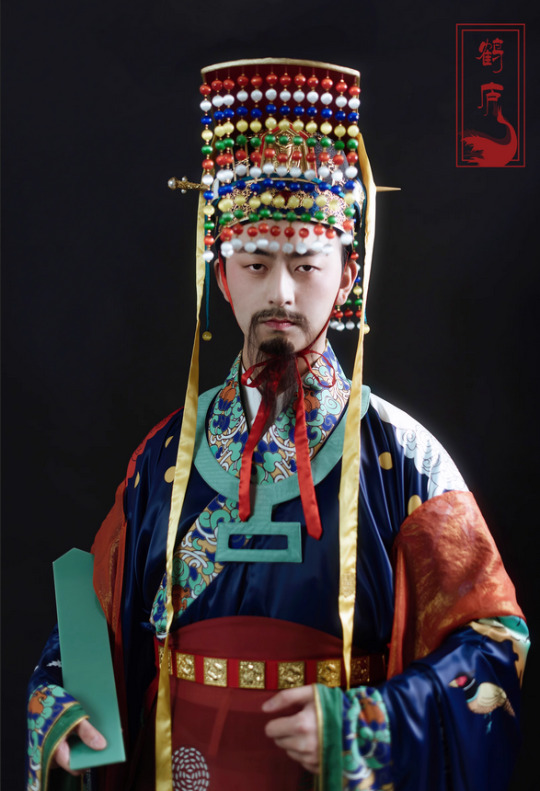
(【鹤庐】汉服)
As for offensiveness, sorry that I can't give you an answer.
#yunjian#hanfu#mens hanfu#opera costume#xifu#chinese opera#butterfly lovers#pibo#history#reference#ask#reply#fouryearsofshades#myrtillei#r
65 notes
·
View notes
Text
All
2368736283 51lookatme a-dirty akane88 albee0820 ann945520 ar-carcass asd7789789dsa asianbreeding asiancuckoldlover asianfiona anny1221 aurora bersih76 biyangla bjqlbo blueskybjbj cainv caoyuanbazhu cc198704 ccdjb channi2324 chinatin chinkogirl clxtbl cmizico cnkeyes666 cocksucker2828 coco9669 conanhomles crowley11 cz101600 doggyney d53471 dashan666 dream dusadoggy elenathepureone eumlansonyeon feiermm felixpimp1234 francis20081968 frosty-land fuckwife fuktwgirl gangbangdpp ganodermabitch gogoylj grosserboss half9999 heisarah94 helloyying hksissycockwhore hlmmbaby hongjizhifeng hongwuye htl69 huoer ivanyao ivylovemaster jsg-qi komamm konstantine30 lgwwl7777 ll0202 lonelypatients025 lovesex1993 lymsdl madkinggg maimiao maomao1069 maonuya masterkama miqinghudie miumiuhz mjq77 mmuuu55 mysluttysexywife nonogook ntr1234 nuoer nzzg ochotwifelover omnibusrrr pangxiaonuoyaogege pennysexy qiqimeijiqi queendanmo queenwen redwei russy555 saosao789 saosaoqiuai sexyyc shijian99570 smwife soratum soulwaiting tiffanypang16 tutucindy unasit valiantlygli33tterysheep viewpro wanimal1983 wanze123 wlovelw0816 woshisaobi123 xavieml xbx123 xiaogougou xiaokonglaoshi xiaonaonao xiaowanzi xiaowu521511 xiaoxiaobai12138 xiaoyao521 xifu xingnululu yaoyaomei yawener yinqi-ntr yinwoqi yiyi2016kink yohomiao yuanweimugou zhling1994 zhuchangan zippysfunhouse honey886 liruipu sluttyfayfay-921 piaoliangpigu lr710666810 julkjilu solomankin u44002 thissexysecret sllaavvee haotianfuck420 puppygirlella twwife xiaoxifu2016 porisound lingzai01 gongju-s2 heremysexypage liumeng22 1024823 chengfb mugou1998 linglingpapapa fuckme018 mrlovelyqwerty hariaiaiai bill801 weltlee sexcat6 yindangxiaomugou m-ft crazyjago annoyinglyhopefulstarlight qaqiiiii zoikhem-lad-choye canicumyouphoto siwamugou bobo-cccc1 yuyi0479 bishihuiyi dream-wets skykid520
10 notes
·
View notes
Text
Sơ mi lỗ Xifu
Sơ mi lỗ Xifu
Sơ mi lỗ là sản phẩm được làm từ 100% nguyên liệu PP cao cấp giúp bảo vệ môi trường. Bề mặt của sơ mi lỗ bền, trơn thuận tiện cho người sử dụng đưa giấy tờ vào và ra. Gía trên là giá của 1 tập bao gồm 100 túi , hàng loại trung dễ tách , ko phải hàng tem đỏ là hàng mỏng rất dít khó tách túi Giá sản phẩm trên Tiki đã bao gồm thuế theo luật hiện hành. Bên cạnh đó, tuỳ vào loại sản phẩm, hình thức và…
View On WordPress
0 notes
Note
Hello! Do you happen to have a post on costumes for traditional Chinese operas like Peking operas, Kunqu or Yueju? I imagine they would be stage wears that were different than daily wears even back in the day? Thanks.
Hi! Thanks for the question, and sorry for taking ages to reply! (kunqu image via)

Yes, Chinese opera costumes (戏服/xifu), as stagewear, were/are different than daily wear.
There are posts on costumes for traditional Chinese operas here:
Do Chinese opera costumes count as hanfu?
What type of clothing do Beijing opera actors wear?
Are Chinese opera costumes based on hanfu to some extent?
I also have Chinese opera and opera costume tags with more information, as well as tags for specific types of Chinese opera including beijing opera (jingju), kunqu, and yueju.
Hope this helps!
#chinese opera#opera costume#xifu#beijing opera#jingju#kunqu#yueju#yue opera#ask#reply#history#reference#chinese fashion#chinese clothing#chinese culture#china#s
95 notes
·
View notes
Note
This particular type of theatrical/performance outfit is not uncommon in Chinese opera and other Chinese performing arts such as dance. It does resemble feitian costume and may be based on/inspired by it. I'd put it in the category of xifu/戏服 (Chinese opera costumes), which covers many styles as I described here and here.
Hi! First of all I wanted to say that I only just found your account recently and it's very interesting, I love learning about other cultures and clothing has always been a big reason for that so I really appreciate the amount of research you put into your work!
Anyways, I'm also a big fan of Journey To The West and I found this photo depicting Princess Iron Fan that came from a 2010 Chinese opera performance "Monkey King: Flaming Mountain". Her outfit is very very pretty but I couldn't find any info on it no matter how hard I tried, the one thing I managed to find that was similar was called a feitian dress (I think, sorry if that's wrong), but they don't look quite the same as the one in this performance. I was wondering if you knew what it was called and if it has any historical accuracies behind the design of her outfit as well, thanks in advance! :)
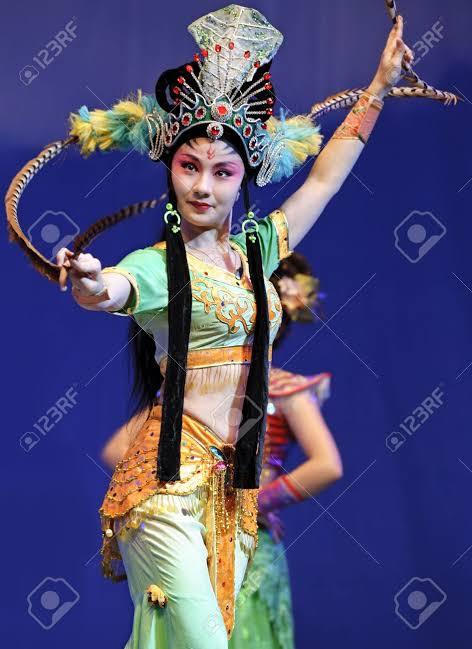

Thank you so much for your kind words! I'm glad you're enjoying my blog.
So, I think you're on the right track with "feitian" dress. Another culture/ historical fashion blog, @ziseviolet, wrote an excellent post about feitian dress, its origins, and its modern versions that you should read here: https://www.tumblr.com/ziseviolet/672232299973296128/what-exactly-does-dunhuang-style-mean?source=share
Another thing to note is that it's a Chinese Opera performance, meaning that the costumes will blend the well-known character traits & signifiers from the original tale mixed with traditional Chinese Opera costumes/ accessories. As far as I could tell, Princess Iron Fan is some kind of demoness in the original story, and many gods/bodhisattvas/apsaras (i.e. feitian)/ demons were depicted wearing "feitian" style clothing to indicate their non-humanness to audiences.
We know that feitian style clothing isn't historically accurate and that many aspects of Chinese Opera costumes are also not historical, so there's not much else to find regarding this version of Princess Iron Fan's costume. I do agree that it's very pretty, but I don't think it has any special name or style other than "feitian." I hope you find this answer helpful! If not, see if @ziseviolet may have a better answer for you!
Regards,
Koikishu
#princess iron fan#tieshan gongzhu#Journey To The West#xiyouji#chinese opera#opera costume#xifu#feitian#feitian costume#ask#reply#reference#koikishu#gh0st-t0wn3#r
64 notes
·
View notes
Text
2368736283 51lookatme a-dirty akane88 albee0820 ann945520 ar-carcass asd7789789dsa asianbreeding asiancuckoldlover asianfiona anny1221 aurora bersih76 biyangla bjqlbo blueskybjbj cainv caoyuanbazhu cc198704 ccdjb channi2324 chinatin chinkogirl clxtbl cmizico cnkeyes666 cocksucker2828 coco9669 conanhomles crowley11 cz101600 doggyney d53471 dashan666 dream dusadoggy elenathepureone eumlansonyeon feiermm felixpimp1234 francis20081968 frosty-land fuckwife fuktwgirl gangbangdpp ganodermabitch gogoylj grosserboss half9999 heisarah94 helloyying hksissycockwhore hlmmbaby hongjizhifeng hongwuye htl69 huoer ivanyao ivylovemaster jsg-qi komamm konstantine30 lgwwl7777 ll0202 lonelypatients025 lovesex1993 lymsdl madkinggg maimiao maomao1069 maonuya masterkama miqinghudie miumiuhz mjq77 mmuuu55 mysluttysexywife nonogook ntr1234 nuoer nzzg ochotwifelover omnibusrrr pangxiaonuoyaogege pennysexy qiqimeijiqi queendanmo queenwen redwei russy555 saosao789 saosaoqiuai sexyyc shijian99570 smwife soratum soulwaiting tiffanypang16 tutucindy unasit valiantlygli33tterysheep viewpro wanimal1983 wanze123 wlovelw0816 woshisaobi123 xavieml xbx123 xiaogougou xiaokonglaoshi xiaonaonao xiaowanzi xiaowu521511 xiaoxiaobai12138 xiaoyao521 xifu xingnululu yaoyaomei yawener yinqi-ntr yinwoqi yiyi2016kink yohomiao yuanweimugou zhling1994 zhuchangan zippysfunhouse honey886 liruipu sluttyfayfay-921 piaoliangpigu lr710666810 julkjilu solomankin u44002 thissexysecret sllaavvee haotianfuck420 puppygirlella twwife xiaoxifu2016 porisound lingzai01 gongju-s2 heremysexypage liumeng22 1024823 chengfb mugou1998 linglingpapapa fuckme018 mrlovelyqwerty hariaiaiai bill801 weltlee sexcat6 yindangxiaomugou m-ft crazyjago annoyinglyhopefulstarlight qaqiiiii zoikhem-lad-choye canicumyouphoto siwamugou bobo-cccc1 yuyi0479 bishihuiyi dream-wets skykid520
10 notes
·
View notes